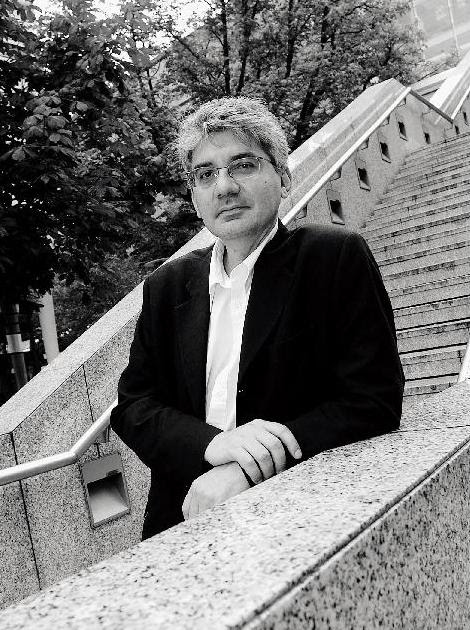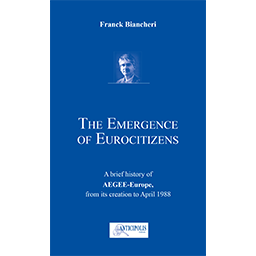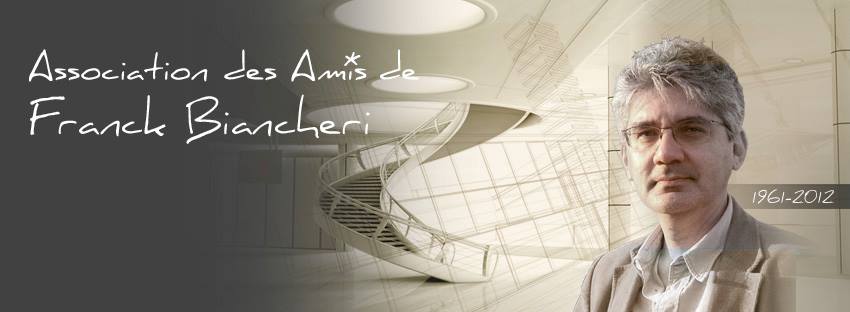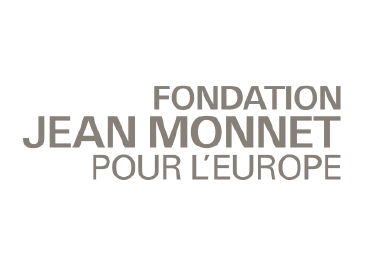A few months before the European elections it is time to rest, as Franck Biancheri did in 2005, some questions about communication policies at the european and national level at the cost of tens of millions of Euros and which have great difficulty to restore the reputation of the European institutions … because these famous experts still do not seem to have understood that citizens do not wait to be told how “sexy” Europe is, or “all what Europe is doing for them”, but ratherwhere Europe is going and who is leading Europe.And this is a political debate that is fundamental …
[divider]
Obviously, this topic is hot! Reactions to my editorial entitled “Communication strategies cannot solve anymore the communication deficit of the EU institutions” and yesterday’s editorial by Anne de Malleray on “L’Europe sexy“ have shown that these issues are debated. And indeed, now with the ratification of the Constitution by referendum (9 states in total, involving more than 200 million citizens: a historic first for our continent) and following the debacle of participation in the last European elections, it is time we ask some questions about these communication policies, carried out for more than 15 years at the community and national level, costing tens of millions of Euros.
Especially since now, once more, referendum campaigns to the hopes of the Commission to improve its public image will cost some more tens of millions of Euros.
So, experts of all kinds and “well known” specialists are visibly abounding around ministries and European institutions. Since politicians do not know how to speak of Europe to their citizens, this know-how void is being filled by a group of consultants and technocrats who all claim to be more experts in the field than their neighbours: some seek influence, but most of them seek funding. However, 99% of them share the same feature: they have never managed to personally make anyone change their minds in their life, even in their own environment, for example, regarding European matters. Most of them have never even tried to do so (and yet they show off about having done it before).
This must be part of “real professional” brands: those who have no conviction but offer their services to the highest bidder. Nevertheless, even in Africa, everyone knows now that the time of the mercenaries is over … except within the community circuit!
But, do not worry about them. For a little less than a decade, our dear European communication “experts” have developed a “powerful” concept allowing them to move into the EU’s communication landscape without having any concrete experience of what it actually represents on the ground nor any conviction on the merits. This miraculous concept is called the “European public space”.
Do not look for it around you. It does not exist anywhere except in very specific places of the EU, ie academic or institutional colloquia on the EU’s communication deficit, the responses of the “communication expertise companies” to Community and national call for and the internal meetings of the technocrats in charge of the subject.
This “admirable” concept aims to explain that there is a way of “communicating around Europe” (ie its institutions, policies, projects, decision-makers, values, etc.) without actually entering into any substantive political debate and thus eliminating all the issues that upset (why? how? utility? impact? who? …).
Generally, associated with this concept, we find a not less “fabulous” actor, the civil society, which exists, but in this case is adorned with a singular (and totally wrong) virtue: political neutrality. This “European public space” could be animated by “civil society actors” who would of course benefit from the enlightened advice of “European communication experts”! For all those who could laugh, I would simply like to point out that this type of “slang” has been the subject of almost every call for proposals in the field of EU communication for a decade.
Of course, any field experience can demonstrate not only the inexistence of this sanitised castrated “European public space”, which is an attempt to hide the face before the emergence, in the last ten years, of a “European political space”. As I recently had the opportunity to remind a “communication expert on Europe” who praised me for the “Power-Point” for local conferences: “This is not a power-point people are waiting. It is for someone who comes, hands in the pockets, listen to some opinions on the EU and discuss it frankly with them. Worse, the power-point is the best way to further strengthen this image of a remote, techno and therefore unkind UE. But of course, the “hands in the pockets” are not “taxable”, whereas the power-point is!
In conclusion, the debate on the EU now belongs to a European political area. Citizens have a vision and political expectations in relation to the EU. They have opinions and political questions and expect similar debates. The fact that our politicians and our “Experts” do not know how to answer them do not change a thing. The concept of “European public space” is a fiction which has never allowed and will not allow to “Reconnect” community institutions with their fellow citizens. It is unfortunate to think that tens of millions of euros will still be swallowed up by the Commission and the Member States in this fiction, for lack of questioning of their concepts.
As questions (and not answers) make things happen, here are some which could help our leaders see things more clearly: What is the most important thing for the future of the EU? The Constitution or the referenda involving 200 million citizens of nine countries? The product or the process?
What do you think?
![]() Franck Biancheri, Cannes – 16/02/2005
Franck Biancheri, Cannes – 16/02/2005
[divider]
[divider]
A quelques mois des élections européennes il est temps de se reposer, comme Franck Biancheri le faisait en 2005, certaines questions sur les politiques de communication menées au niveau communautaire et national à coup de dizaines de millions d’Euros et qui ont bien du mal à redorer le blason des institutions européennes… car ces fameux experts ne semblent toujours pas avoir compris que les citoyens n’attendent pas qu’on leur dise combien l’Europe est “sexy”, ou “tout ce qu’elle fait pour vous” mais où elle va et qui la dirige… et c’est bien un débat politique de fond qui s’impose…
|divider]
Visiblement, le sujet est à la mode ! Les réactions à mon éditorial « Communication strategies cannot solve anymore the communication deficit of the EU institutions » , et l’édito d’hier, d’Anne de Malleray, sur « L’Europe sexy» ont montré que ces questions font débat. Et en effet, en ces temps de ratification de la Constitution par référendum (9 au total impliquant plus de 200 millions de citoyens: une première historique pour notre continent) et suite à la débâcle de la participation aux dernières élections européennes, il est temps de se poser certaines questions sur ces politiques de communication, menées depuis plus de 15 ans au niveau communautaire et national, à coup de dizaines de millions d’Euros.
Surtout que cette fois-ci encore, des campagnes référendaires aux espoirs de la Commission de redorer son image publique, ce sont d’autres dizaines de millions d’Euros qui vont être dépensés.
Alors, évidemment, experts en tout genre et spécialistes « reconnus » pullulent autour des ministères et des institutions européennes. Les politiques ne sachant pas comment parler d’Europe à leur concitoyens, ce vide de savoir-faire est comblé par une noria de consultants et technocrates se prétendant tous plus savants en la matière que leurs voisins : les uns y cherchent de l’influence, la plupart des financements. Cependant 99% d’entre eux partagent la même caractéristique : ils n’ont jamais personnellement fait changer d’avis qui que ce soit dans leur vie, même dans leur propre entourage par exemple, en matière européenne. La plupart d’entre eux n’ont d’ailleurs même jamais cherché à le faire (et s’en vantent d’ailleurs).
Cela doit être la marque des « vrais professionnels » : ceux qui n’ont aucune conviction et offrent leurs services au plus offrant. Pourtant, aujourd’hui, même en Afrique, tout le monde sait que le temps des mercenaires est fini …. sauf visiblement sur le circuit communautaire !
Mais, ne nous inquiétons pas pour eux. Depuis un peu moins d’une décennie, nos chers « experts » en communication de l’Europe ont élaboré un concept « puissant » qui leur permet de s’installer dans le paysage de la communication de l’UE sans avoir ni la moindre expérience concrète de ce qu’elle représente réellement sur le terrain, ni la moindre conviction sur le fond. Ce concept miraculeux s’appelle « l’espace public européen ».
Ne le cherchez pas près de chez vous. Il n’existe nulle part hormis dans des endroits bien précises de l’UE, à savoir les colloques universitaires ou institutionnels sur le déficit de communication de l’UE, les réponses des « boîtes de comm » à des appels d’offre communautaire et nationaux en matière de communication sur l’Europe et les réunions internes des technocrates en charge du sujet.
Ce concept « admirable » vise à expliquer qu’il existerait une manière de « communiquer l’Europe » (c’est-à-dire ses institutions, ses politiques, ses projets, ses décideurs, ses valeurs, …) sans entrer dans aucun débat politique de fond et en éliminant ainsi toutes les questions qui fâchent (pourquoi ? comment ? utilité ? impact ? qui ? …). Généralement associé à ce concept,on retrouve mentionné un acteur non moins « fabuleux », la société civile, qui existe bien elle, mais qui en l’occurrence est parée d’une vertu singulière (et totalement erronée) : la neutralité politique. On pourrait ainsi animer cet « espace public européen » avec l’aide d’ « acteurs de la société civile » qui bien entendu bénéficieraient des conseils éclairés d’ « experts en communication de l’Europe » ! Pour ceux que cela pourrait faire rire, je voudrais simplement souligner que ce type de « jargon » peuple la quasi-totalité des appels à proposition dans le domaine de la communication de l’UE depuis une décennie.
Bien entendu, toute expérience de terrain permet de démontrer non seulement l’inexistence de cet« espace public européen » aseptisé, castré qui n’est qu’une tentative de se voiler la face devant l’émergence, au cours des dix dernières années, d’un « espace politique européen ». Comme j’ai eu l’occasion de le rappeler récemment à un « expert en communication sur l’Europe » qui me vantait le mérite du « Power-Point » pour les conférences de proximité : « Ce n’est pas un power-point que les gens attendent, mais quelqu’un qui vient, les mains dans les poches, écouter leurs opinions sur l’UE et en discuter franchement avec eux. Pire, le power-point est le meilleur moyen de renforcer encore plus cette image d’une UE distante, techno et donc peu aimable. » Mais bien entendu, les « mains dans les poches » ça n’est pas « facturable », alors que le power-point, oui !
Pour conclure, le débat sur l’UE appartient désormais à un espace politique européen. Les citoyens ont une vision et des attentes politiques par rapport à l’UE. Ils ont des opinions et des questions politiques et attendent des débats du même ordre. Le fait que nos politiques et nos« experts » ne sachent pas comment leur répondre n’y changent rien. Le concept d’ « espace public européen » est une fiction qui n’a jamais permis et ne permettra pas plus demain de « reconnecter » les institutions communautaires avec les citoyens. Il est dommage de penser que néanmoins des dizaines de millions d’Euros vont encore être engloutis par la Commission et les Etats-Membres dans cette fiction, faute de remise en cause de leurs concepts.
Comme ce sont les questions (et non pas les réponses qui font progresser les choses), en voilà une qui pourrait aider nos dirigeants à y voir plus clair en la matière: qu’est-ce qui est le plus important pour l’avenir de l’UE : la Constitution ou les référenda impliquant 200 millions de citoyens de neuf pays ? Le produit ou le processus ?
Et vous, quel est votre avis ?
![]() Franck Biancheri, Cannes – 16/02/2005
Franck Biancheri, Cannes – 16/02/2005
[divider]
![]() Téléchargez le pdf: Communication de l’UE (suite) :L’ « espace public européen » est une fiction inventée par des universitaires et des technocrates (Franck Biancheri, 16/02/2005)
Téléchargez le pdf: Communication de l’UE (suite) :L’ « espace public européen » est une fiction inventée par des universitaires et des technocrates (Franck Biancheri, 16/02/2005)
[divider]
Plus d’articles de Franck Biancheri: Franck Biancheri Documentation
[divider]






